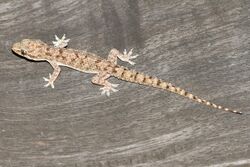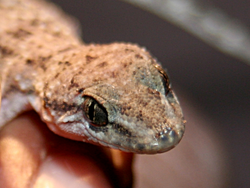Biology:Hemidactylus brookii
| Hemidactylus brookii | |
|---|---|

| |
| Scientific classification | |
| Domain: | Eukaryota |
| Kingdom: | Animalia |
| Phylum: | Chordata |
| Class: | Reptilia |
| Order: | Squamata |
| Family: | Gekkonidae |
| Genus: | Hemidactylus |
| Species: | H. brookii
|
| Binomial name | |
| Hemidactylus brookii Gray, 1845
| |
| Synonyms | |
| |
Hemidactylus brookii, also known commonly as Brooke's house gecko and the spotted house gecko, is a widespread species of lizard in the family Gekkonidae.
Etymology
The specific name, brookii, is in honor of British adventurer James Brooke.[2]
Description
Snout somewhat longer than the distance between the eye and the ear-opening, nearly twice the diameter of the orbit; forehead concave; ear-opening small, oval, vertical, about one third the diameter of the eye; on the occiput very small round tubercles. Rostral quadrangular, with a median cleft; nostril bordered by the rostral, the first upper labial and three nasals, the upper not in contact with its fellow. Eight to ten upper and seven to nine lower labials; mental large, triangular; two or three pair of chin-shields, median forming - a suture. Scales of the throat granular. Body covered with small granules, intermixed with large keeled trihedral tubercles, arranged in 16-20 longitudinal series, the keels of the outer ones indistinct; the diameter of the largest tubercles on the flanks exceeds the diameter of the ear-opening. Ventral scales larger than those on the throat, cycloid, imbricate. Male with 7-20 femoral pores on each side. Tail depressed, annulate, with rows of 8 or 6 spine-like tubercles, below with a series of transversely dilated plates. Limbs granular, the upper part of the hind limb with large keeled tubercles; digits free, dilated, the free distal joint long, 3-6 lamellae under the inner, 6-8 under the median toes.
Yellowish-brown above with irregular dark spots; one or two dark lines on the side of the head, passing through the eye; lips with dark bars. Lower parts white; all the scales finely dotted with dark brown. Young specimens have cross lines of white tubercles on the back; those on the tail all white.[3]
Length of head and body 58 millimetres (2.3 in), tail 60 millimetres (2.4 in).
Geographic range
By subspecies:
- brookii
- Senegal, Togo, Angola, Cape Verde, Tanzania, Gambia, Democratic Republic of the Congo, Ghana, Eritrea, Ethiopia, Mali, Central African Republic, Ivory Coast, Cameroon, Sudan (Dagana + Goree Dondo/Cuanza River Atakpame).
- India (Himalaya), Bhutan, Thailand (HR 33: 322), Maldives, Malaysian Peninsula, Sri Lanka, Myanmar (= Burma) (Tsagain), Pakistan , Bangladesh, Nepal, Indonesia (Borneo).
- Mexico, Honduras, Haiti, Antilles, Cuba, Hispaniola, Puerto Rico, Port-Au-Prince, Trinidad, Colombia
- angulatus: Sudan, Uganda, south to Tanzania, west to Senegal. Zanzibar, Pemba Island.
- Type locality: West coast of Africa = Gabon [angulatus]
- leightoni: Venezuela (Zulia), Colombia
- Type locality: "Ada Foah (Guinea)" [= Ghana] [Hemidactylus guineensis PETERS 1868]
References
- ↑ "Hemidactylus brookii | IUCN RedList". https://www.iucnredlist.org/species/172703/1370220.
- ↑ Beolens, Bo; Watkins, Michael; Grayson, Michael (2011). The Eponym Dictionary of Reptiles. Baltimore: Johns Hopkins University Press. xiii + 296 pp. ISBN:978-1-4214-0135-5. (Hemidactylus brookii, p. 39).
- ↑ Rooij, Nelly de (1915). The Reptiles of the Indo-Australian Archipelago. I. Lacertilia, Chelonia, Emydosauria. Leiden: E.J. Brill. xiv + 384 pp. ("Hemidactylus brooki [sic]", pp. 32-33 + Figure 20).
Further reading
- Annandale N (1905). "Notes on some Oriental geckos in the Indian Museum, Calcutta, with Descriptions of new Forms". Annals and Magazine of Natural History, Seventh Series 15: 26-32.
- Bauer AM, Günther R (1991). "An annotated type catalogue of the geckos (Reptilia: Gekkonidae) in the Zoological Museum, Berlin". Mitteilungen aus dem Zoologischen Museum in Berlin 67: 279-310.
- Bauer AM, Pauwels OSG, Sumontha M (2002). "Hemidactylus brookii brookii, distribution". Herpetological Review 33: 322.
- Das I (2006). A Photographic Guide to Snakes and other Reptiles of Borneo. Sanibel Island, Florida: Ralph Curtis Books. 144 pp. ISBN:0-88359-061-1. (Hemidactylus brookii, p. 101).
- Gleadow F (1887). "Description of a new lizard from the Dangs". Journal of the Bombay Natural History Society 2: 49-51.
- Gray JE (1845). Catalogue of the Specimens of Lizards in the Collection of the British Museum. London: Trustees of the British Museum. (Edward Newman, printer). xxviii + 289 pp. (Hemidactylus brookii, new species, p. 153).
- Mitchell JC, Zug GR (1988). "Ecological observations on the gecko Hemidactylus brookii in Nepal". Amphibia-Reptilia 9: 405-413.
- Powell R, Maxey SA (1990). "Hemidactylus brookii ". Catalogue of American Amphibians and Reptiles. No. 493.
External links
- Hemidactylus brookii at the Reptarium.cz Reptile Database
- "Brook's House Gecko (Hemidactylus brookii) | U.S. Fish & Wildlife Service". https://www.fws.gov/species/brooks-house-gecko-hemidactylus-brookii.
Wikidata ☰ Q387229 entry
 |



